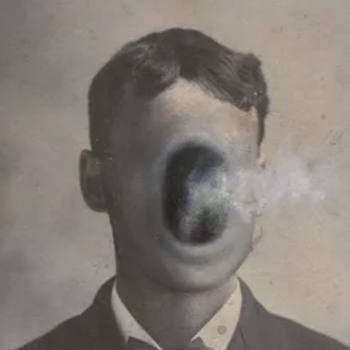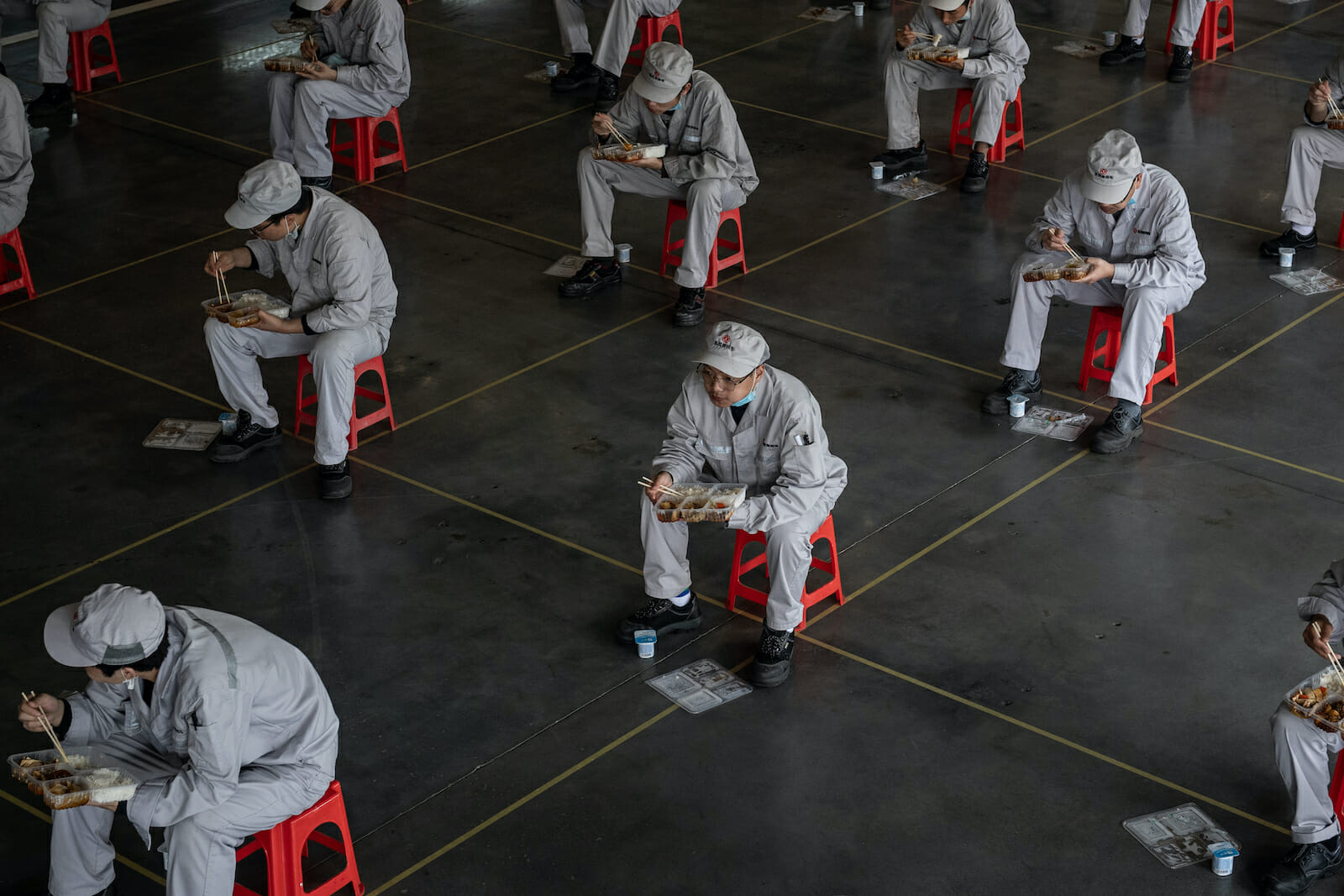
Longform
Living Under China’s Zero-COVID Policy
Last year I traveled to China from America to start a new job. Expectations were high that incoming President Biden would attempt to re-introduce a sense of normalcy to the bilateral relationship with China. I went there at the very height of the COVID-19 pandemic – in America and the world – when the virus was ravaging the populations of country after country, vaccines were only beginning to be distributed globally and about 5,000 Americans were dying from the disease each day.
Based on official statistics from the Chinese government, there were no more than a few dozen documented cases of the virus in China at the time. This was the result, it claimed, of a year of draconian policies forcibly restricting travel, locking down cities and towns, testing literally millions of people in a matter of days, and contact tracing where outbreaks had occurred as only the Chinese government can do. The contrast between how the two countries had addressed the pandemic could not have been more stark – particularly considering that China has four times the population of the U.S.
It, therefore, made perfect sense to the government of China that all individuals arriving from outside the country would spend three weeks in quarantine in another city before being allowed to travel to Beijing, for example. This was not the “voluntary” quarantine that some states in America had toyed with over the course of 2020. A year after the pandemic had broken out, the American government’s horribly botched and feeble effort to address the virus was only just starting to change following the election of Biden. I was not happy to have to admit that Americans had really brought their absurd degree of suffering on themselves, the result of a combination of the Trump administration’s inexcusably bad response to the pandemic in combination with so many Americans’ pigheaded approach to taking basic precautions to protect themselves – and others – such as wearing face masks and social distancing.
Until the day I departed, I continued to witness some of my fellow Americans either not wearing masks or failing to do so correctly. This was mystifying to me. It took many Americans an entire year of having the importance of wearing masks drilled into their heads by a constant assault from the media in order for the wisdom of doing so to finally start to sink in. But tens of millions of Americans refused to do even that.
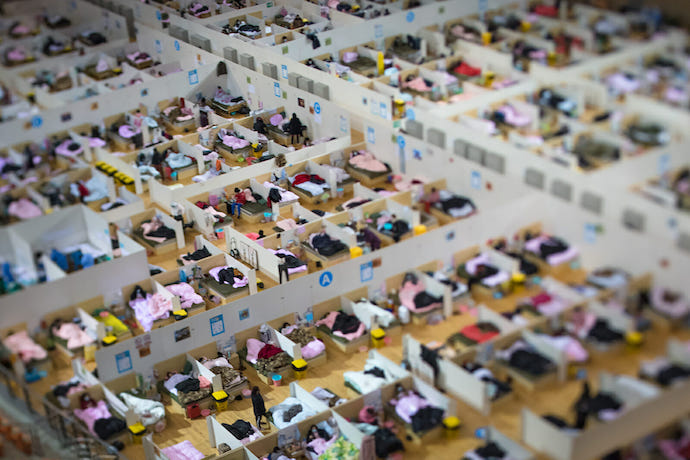
My quarantine was no picnic. Though billed as 4-star, my hotel was really more like 3-stars. My standard room had two twin-size beds, one of which had no sheets on it when I arrived, for some reason. At least it had a nice view of the river and city when the air was not so polluted that they were difficult to see. I was to spend 14 days there without the ability to leave my room, complete with crappy hotel food and a shitty Internet connection. I had to jimmy-rig signal from adjacent rooms, because, despite repeated attempts to get the WiFi router in my room to work – including having it replaced – it would not. My body temperature was taken electronically twice a day and my food was delivered (nearly always cold) by young men and women wearing hazmat suits, who sometimes rang the doorbell to let me know it had arrived and sometimes not – meaning the food would then be ice cold by the time I opened the door to see if it had arrived.
Although some would argue that such a draconian approach to COVID management is exactly what the U.S. desperately needed at the time, it would never work, much less be attempted there. Americans treasure their basic freedoms – including the freedom to be just as stupid as they want to be – even if that means the freedom to do harm to themselves and others in the process. I covet my personal freedom as much as the next guy, but I draw the line when individual freedom negatively impacts the health and lives of others. Many Americans never seemed to understand that, nor cared that they didn’t.
There was no need to have a “minder” outside my door or anywhere else in my hotel. Apart from the fact that I had no intention of stepping foot outside my hotel room door for two weeks, all the halls, stairwells, and elevators were electronically monitored and the elevators were blocked without a key card. Big Brother is everywhere in China and Chinese citizens are well aware of the government’s ability to keep tabs on their every movement. I was even instructed to drop chlorine pills into the toilet every time I had a bowel movement in an attempt to kill the virus before flushing.
In addition to reliance on the microphones and cameras we all so religiously keep within an arm’s length of our bodies 24/7 – our smartphones – Chinese society is the most surveilled on earth. Surveillance using electronic facial recognition is an art form in China and, unlike in so many other countries, breaking the rules comes with consequences. That is a big reason why the average Chinese citizen does not even jaywalk.
If you come to China without a functional Virtual Private Network (VPN), the Great Firewall will prevent you from accessing most Internet sites from outside the country. I went to China having downloaded three VPNs (and subsequently, three more) and had access to nearly every site I would normally use on a daily basis outside the country. Interestingly, even without a VPN, I could access some news sites, such as CNN. I have no good explanation for why they were so readily accessible, but while Google-based sites did not work in the absence of a VPN, Microsoft-oriented sites generally did. I was easily able to access Hotmail and MSNBC, for example.
The Chinese are naturally competitive – with each other and the rest of the world. One of the first things I noticed when moving there is that everything is a competition – simply by virtue of the fact that there are 1.4 billion Chinese citizens. I spent the third week of my quarantine in a hotel I was allowed to select. I was also able to roam about the city freely during that third week.
The hotel was a nice place, so, naturally, some of the families that were restricted from traveling because of the pandemic gravitated to such hotels for staycations and celebrations – in droves. It was fully booked. Getting breakfast from the multi-station buffet each morning turned into a real chore with so many people “competing” for their breakfast fare.
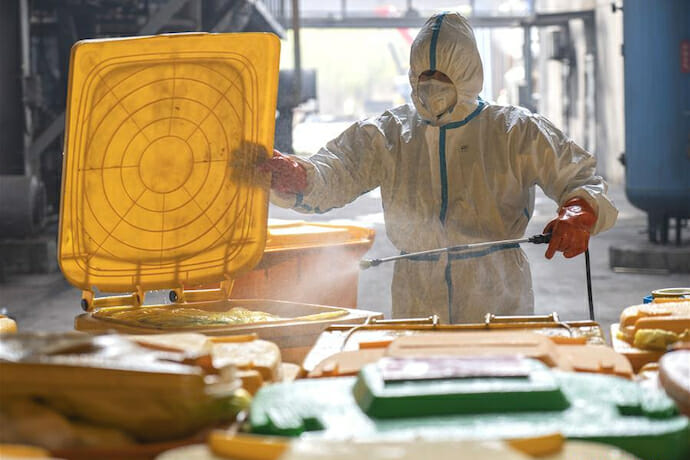
Part of the reason for that is the lack of protocol and common courtesy, such as waiting for someone to finish gathering their food at a station before diving in yourself. It was a competition, after all. Speaking with the concierge? Don’t be surprised if a Chinese person interrupts and barges right in. Going upstairs in the elevator? Never mind that someone was already waiting ahead of you – it’s every man and woman (and family member) for themselves. And man did they pack the elevators – until there was no space left! Elevator car after elevator car! It was so bad that I chose to wait until I could get an elevator with just one or two other people inside – which meant sometimes I would wait for up to 10 minutes.
Social distancing in a hotel during COVID? You can forget about it! Once inside a hotel, many Chinese stopped thinking about wearing a mask – as if the concept of germs only existed outside the hotel! It really boggled my mind. It did make me wonder, however, how China could have avoided massive levels of COVID infections when so many citizens appeared to take leave of their senses so easily. America had more than its share of COVIDiots, but so did China. Strangely, it didn’t seem to matter that wearing masks was actually mandated inside the hotels, too – there was just no penalty attached to not doing so because the government wasn’t watching.
The numbers of “official” cases of COVID-19 in China were mind-boggling – zero cases in all of Beijing, 3 cases in Shanghai, a couple here, several there. Having come from America at a time when 350,000 Americans were reported infected on a daily basis, I felt something had to be wrong with China’s reporting protocols. Having witnessed the behavior of China’s own COVIDiots, it made even less sense. I wondered, are the Chinese authorities that good, or was it all just part of the government-driven narrative about what a good job it had done beating down and then controlling the virus? I came to realize that the Chinese government really is that good. When the Delta variant of COVID-19 erupted in Nanjing in July 2021, I was able to witness the government “machine” in action.
As anyone familiar with China already knows, it has created a great leap into our collective future all on its own. One of the things that becomes apparent – almost as soon as one lands in China – is just how far advanced the country is in harnessing artificial intelligence into ordinary tasks and daily life. Whether it is facial recognition at the airport or scanning QR codes, the CCP deserves credit for having transitioned Chinese society away from the comparatively horse and buggy use of analog technology, cash or credit cards to digital technology and currency.
For the first month, after I arrived – until I had actually physically walked into my new employer’s office building, I was forced to use cash and credit cards to pay for things. That is because I could not open a bank account until I had become established in my city of residence. Believe me, it was difficult to get things done with cash and credit cards. Most vendors wouldn’t even accept them. One taxi driver yelled at me for giving him cash, even though I was forced to give him a large tip because, of course, he didn’t have any change! Oddly enough, if you pay in cash in stores, they are obliged to give you exact change, but restaurants don’t generally accept credit cards. And just try to use cash to take a trip on the subway! They have machines that theoretically accept cash, but most of them (in my experience) accept only the smallest denominated bills if that.
One quickly comes to realize that WeChatPay and AliPay are indispensable lifelines to functioning in Chinese society. The way it works is this: you open a bank account, obtain a debit card, link it to your WeChatPay or AliPay account, and pray you never lose your phone! Losing a smartphone in China is ten times worse than losing it in most other places because you simply cannot function. And, by definition, your phone contains much more personal and financial information than might otherwise be the case. Where you go, what you buy, how much you pay, and even who you are with are all digitally recorded as a result of using these payment apps.
Say you are at a restaurant and want to split a bill three ways. WeChatPay has a function specifically designed to allow you to do so. Doing so digitally records where and when you went as well as who you split the bill with. Need to call Didi (China’s equivalent to Uber) to get home afterward? The car you took, its driver, the time you left and arrived, and the amount you paid are all recorded (as well as being digitally video recorded). Run out of phone capacity? No problem! WeChatPay has a function that allows you to top it up in a few seconds. This digital payment method is incredibly fast, efficient, and intrusive. Forget having any secrets in China. Between these apps, the hundreds of millions of closed-circuit television cameras, and China’s social credit system, the government knows everyone’s every move.
That does not stop the Chinese government from wanting to enhance all the digital monitoring with good old-fashioned human intelligence, however. Despite the fact that it can watch anyone at any time, the human factor is omnipresent as well. Soldiers, police, security personnel, and undercover agents are watching everywhere as well. Whether entering an office building, hotel, mall, or simply walking the streets, you will inevitably be faced with either a watchful eye and a security check nearly anywhere you may want to go or for practically anything, you may want to do. I’ve had colleagues asked questions by plain-clothed security agents walking to or from their apartments. Want to walk the Bund in Shanghai? Security is everywhere. Want to ride the subway? Be prepared to undergo airport caliber security checks of your bags and person and be watched on every subway train (which has its own car-specific “minder” to ensure you are wearing your mask and not causing any trouble). Want to visit the mall? Be prepared to have your health code checked.
One might be inclined to think that this level of security is a good thing. I do have to say that I felt supremely safe living in China and almost never saw anyone getting out of line in any way. America and many other countries could use a good dose of that! Eventually, you don’t even notice it anymore – it is simply a fact of life. But at times it is all just way too over the top.
For example, during the annual meeting of the Chinese People’s Political Consultative Conference and the National People’s Congress in Beijing, when more than 5,000 members of China’s political elite assemble to establish the central government’s priorities for the coming year, security goes on steroids. Soldiers in green trench coats “guard” the entrances to each subway station and goose-step in unison on the subway platforms. There are at least double the number of security personnel performing security detail and a seemingly endless supply of government employees wearing official-looking gear stand at attention throughout each platform to “guide” passengers in and out of the entrances to the subway cars. And the number of minders who ordinarily “patrol” the subway cars easily double. The same protocols tend to be repeated for other occasions, such as the 2022 Olympic Games.
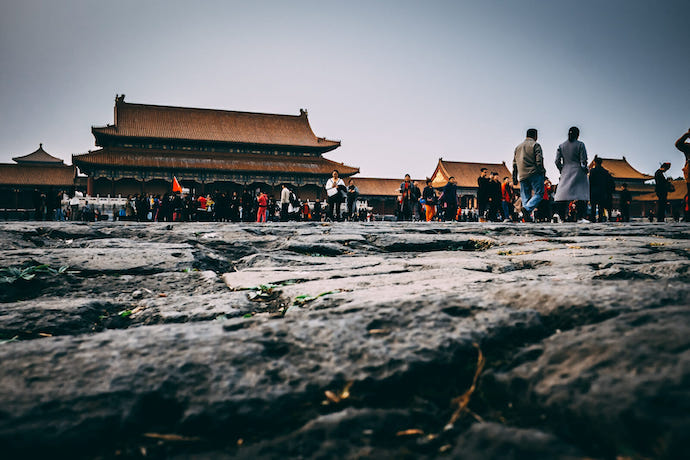
This obsession with security spills over into any number of other aspects of life during the Conference and Congress. In the hotel I stayed in when visiting Beijing, there is a large, elevated walking area. People commonly used the area to walk or jog when the outdoor air was clean enough to do so and the weather permitted. During the Conference and Congress, this was forbidden. We were located miles away from Tiananmen Square, where most of the meetings were held, so I didn’t understand why we were forbidden to walk or jog outdoors. Did they think someone was going to fire a rocket into the Congress or something? So, the walking area had restricted access (only for residents) but, in addition, the government mandated that a security guard had to watch the area to ensure that no one might be tempted to cross the barriers that had been erected and dare to get some exercise. I mean, good luck being any kind of criminal or wrongdoer in Chinese society – your chances of being successful are pretty limited!
The preoccupation with security certainly extends most especially to modes of transportation. When I first arrived at the airport following quarantine, I experienced the most extraordinary security search I’ve ever had in my life at an airport. Ostensibly because they were searching for batteries, I ended up having to empty literally everything into multiple trays – food items, electrical cords, small bags of miscellaneous items – a veritable smorgasbord of uninteresting stuff. Of course, they didn’t find anything worth making all the fuss about, but it took me 30 minutes to re-pack it all. I was really annoyed.
Because the Chinese Communist Party (CCP) has a vise-like grip over Chinese society, there is a seemingly endless list of things one might be inclined to get upset about, but there really is no point, since there is no aspect of daily life that isn’t in some way controlled and prying eyes are everywhere. It’s not enough that a camera watches you at the entrance to a building and the elevator, another watches you in the elevator entry area and the hallways leading to and from it. In major intersections, cameras are pointed in half a dozen different directions. And, of course, our smartphones enable the government, our employers, phone companies, and cell tower owners to know our every move.
If you happened to want to take a stroll to Tiananmen Square or the Forbidden City during the National People’s Congress meetings, expect to be stopped by a soldier and asked to provide your proof of identification. “Random” ID checks occur during that week on the subways, too. I never really understood the purpose of that exercise. Yes, I am who my identification says I am. So what? Does that prove why I am there, where I am going, or whether I should be there or not? Honestly – what are the chances that anyone in China is going to be in Beijing without proper identification in the first place? Throughout the pandemic, Chinese citizens were generally discouraged to travel there, and access was in any event restricted. It was all part of the ongoing reminder of who is in charge (as if any reminder were needed).
I lived in China during some truly momentous events, such as the 100th anniversary of the CCP, the 2022 Winter Olympics, and Russia’s invasion of Ukraine. But one of the most memorable came courtesy of Mother Nature one day when I visited Beijing during the Spring. Sandstorms can occur in the Spring, given Beijing’s proximity to the nearby Gobi Desert, but this particular storm happened to be the worst the city had seen in 10 years. I had looked outside prior to heading to work that day and it looked like the ordinary unhealthy air that had lingered for weeks in the city. But by the time I had had my breakfast and walked outside, it had become very windy and the sky had turned yellow. I didn’t really understand what was happening at first, having never lived through a proper sandstorm before. But by the time I got to work visibility was extremely limited. The view from my office looked like a picture that was completely out of focus. No one should technically have reported for work that day, but almost everyone did. Fortunately, I spent no more than 2 or 3 minutes outside to get to or from work. At least, on the return trip, I was wearing an N95 mask.
One of the strangest things about China’s weather is that the wind can be howling and the air quality can still suck. Such was the reality one Sunday when the air quality index (AQI) was projected to be good and there was a brisk wind, but the air quality was 1,000 again (off the charts bad) because of the second sandstorm in less than two weeks! I can remember flying from Beijing to Hong Kong decades ago and seeing nothing but haze below – for the entire journey. Despite the government’s proclamations that the air has improved in Beijing (and, on a relative basis, it has), the air was either bad or downright nasty about half the time while I was there.
The comparatively decent air of 2020, when much of China has been shut down as a result of the outbreak of the pandemic, appeared to have been little more than an aberration. Once the economy ramped up again, the bad air returned as if nothing had happened. During holidays, when most Chinese were not working, pollution levels can still rise to hazardous levels. According to the U.S. embassy’s air quality index for Beijing, there were only two “good” air days there in March 2021 – the fewest since March of 2018, which had itself been the fewest since April 2016. The air does tend to improve in the warmer months, but it is never green or even yellow on the air quality index (i.e., good or moderate) for longer than a few days.
China is now a middle-income country where, according to the World Bank, the poverty line is income of $5.50 per day. On that basis, roughly a quarter of China’s population remains in poverty. And some 600 million of China’s citizens (about 43%) had a monthly income of around $150 in 2021. So, while the Chinese government can rightly claim some credit for largely eradicating absolute poverty among its citizens, there is still much work to be done. By contrast, as of 2010, nearly a million Americans fell below the internationally recognized poverty level of $2 income per day – a statistic which is hard to believe in a country as wealthy as America. According to the U.S. government, 10.5% of Americans were in poverty as of 2019, down from 11.8% in 2018. That rate was 15.7% for Hispanic Americans in 2019. The overall poverty rate rose dramatically during the COVID-19 era in America.
There are many other contrasts to draw between America and China. There is very little in the way of crime in China, very low violent crime, and zero deaths by guns. As the months went by, I came to really appreciate living in a place where people keep their mouths shut. Contrast that with the lunacy that occurs every day in America – with every nut job having a platform to spew hatred, racist views, lies, fake news, and alternative facts. Many Chinese (and indeed, others around the world) see America as a lunatic asylum these days. “Freedom” run amok. I appreciated also the orderliness and predictability of daily life. The subways always ran on time and were dirt cheap (my daily commute cost about a dollar round trip). I never had to worry whether things that were supposed to get done got done. WeChatPay always worked. Bank transfers were always completed on the same day. When my apartment building front desk said something would be taken care of that day, it was. Such is the Asian Way, more generally, which I have always appreciated about spending time in Asia.
In 2020, there were just over 800,000 foreigners living in China, with approximately 63,000 of them living in Beijing. That was down from 107,000 living in the city in 2010. Surely, part of the reason was COVID-19. In certain parts of town, such as the bustling Sanlitun, foreigners are prevalent. But in many other parts of town, you would be hard-pressed to find any foreigners. I went to numerous restaurants, museums, and other venues where I was the only foreigner in sight. But I never felt unwelcome. Beijingers have become quite accustomed to seeing foreigners throughout the city and barely take any notice. In fact, I would say that 99% of the time, when I rode the subway, no one would even look at me. They were too busy obsessing with their smartphones, like everyone everywhere else in the world.
The summer of 2021 coincided with the most serious outbreak (of the Delta variant) of COVID-19 seen since it began in 2019. An airplane cleaning crew in Nanjing apparently caught the virus by being unprotected while cleaning an Air China flight from Russia. It quickly spread from the airport, of course, and within a couple of weeks had impacted dozens of Chinese cities, including Beijing. In Beijing, just two recorded cases prompted the government to take steps that culminated in shutting the place down. I had planned to visit Chengdu for a long weekend but many forms of public transportation in and out of the city were canceled, just days after the outbreak began. Imagine – a city of 22 million sealed off because of 2 documented cases of COVID-19.
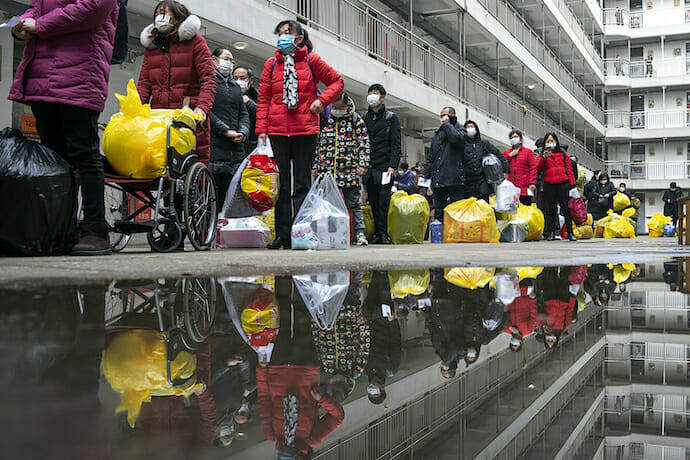
It was fascinating (and instructive) to see the wheels of China’s mammoth state apparatus at work to manage the Delta outbreak. With precision, the government issued mandate after mandate, which were dutifully followed by the population. One of my friends from Beijing happened to be in Wuhan when all the residents in the city (11 million of them) were ordered to get tested. He said the streets emptied and people lined up, dutifully. It only took a few days for all the tests to be administered. Nanjing was shut down. Rail, bus, and air traffic throughout the country was curtailed or eliminated to or from medium or high-risk destinations. People did what they were told and didn’t question it. The government speaks and citizens fall into line – a great contrast, of course, with the freedom of choice that exists in many other parts of the world. But China succeeded in controlling it while few other countries (with the exception of New Zealand, that took the same approach) did. That speaks volumes about the potential benefits of having a one-party dictatorship and no freedom of speech when pandemics or natural disasters hit – they can be effectively managed.
Subsequent outbreaks in Hong Kong, Shenzhen, and most recently, Shanghai, resulted in the same protocols being implemented. With 25 million residents, Shanghai received the most attention, and rightly so. In China, all most Chinese would know is that the virus is being successfully eradicated, even though infections rose to some 25,000 new cases per day – during the lockdown. That is because most do not have access to a VPN so only know what official state media tells them. The rest of the world knew that food and medicine shortages plagued the city and that many Shanghai residents were very upset about being locked up for weeks on end. The economic consequences to Shanghai, China, and the world because of its dependence on China through the global supply chain are significant.
I had hesitated to get vaccinated while in China because I had a pending visit back to America and had intended to get vaccinated there, but the Delta outbreak forced me to get one of the Chinese vaccines (SinoVac). Unlike in America, where one could simply walk into any drug store and receive a vaccine of their choice, in China an appointment had to be made and it had to be verified that there was a sufficient supply of the chosen vaccine at that location. Within minutes of being vaccinated, my WeChat account was updated to show that I had indeed received the jab. All I needed to do was show the display whenever proof was required. It was highly efficient.
A real shame for the Chinese population, as well as that of most of the world which depended on the Chinese vaccines, that they lacked efficacy. Today, the entire Chinese population is, in essence, unvaccinated since it has been too long since they were inoculated and now whatever effectiveness the vaccines had has expired. That is a big part of the reason why the Chinese government is clinging to its zero-COVID policy. Another reason is that it has only 7 million hospital beds for 1.4 billion people.
Not being able to get a Western vaccine became a problem when it came time to return to America for a visit, as Sinovac is not recognized as an accepted vaccine. The reverse is also true – China recognizes only SinoVac or SinoPharm, so returning without an acknowledgment of having been vaccinated in China could create additional complications. Quarantines only became more draconian in China as the Omicron variant of COVID-19 emerged and became widespread in China. What had been a standard three-week protocol turned into 4, 5, and 6-week solitary confinement incarcerations.
As time went on, more and more foreigners and Chinese became fed up with the government’s zero-COVID policy. Foreigners left China in droves during the pandemic, some of them having been separated from their families or partners literally for years in the process. On top of everything else – the inconvenience, indignities, stress, anxiety, and high costs – the zero-tolerance policy prompted hundreds of thousands of foreigners throughout China to abandon the place. Life was not a whole lot of fun with the constant protocols and procedures, security checks, forced mass testing, and the inhuman way so many people were treated in the process.
Traveling to and from America had become the theater of the absurd. If any flights were even available (and from January through March 2022, they were not) a one-way airfare from San Francisco to Shanghai was as high as $7,000 (or 300,000 miles) one-way in economy! This was a mammoth cost for a family of four to go home to visit loved ones and for most, simply inconceivable. The poor state of bilateral relations between America and China only exacerbated the cost, as tit-for-tat flight cancellations persisted throughout the pandemic. I had six different sets of flights to and from America canceled for a single planned trip.
Getting tested and approved to return to China was truly burdensome, as well. The Chinese government approved only six points of embarkation to the mainland from America. Each city had as few as two approved testing centers (where blood was drawn and PCR tests administered) for between $400 and $650 per round of testing. If for any reason the results were not properly delivered to the designated Chinese consulate or embassy in full and on time, no approval code was granted, and the procedure must be repeated. Many people had to endure this process twice or three times to get it right, all the while having to pay for extra lodging, rental cars, and food while they waited days (or up to a week) for the next flight. I spent up to $3,000 each time I went through this process. On top of the horrendous cost of flights, a trip home was a five-figure proposition.
Each time I returned from America I was greeted by people in hazmat suits, forced to get re-tested before leaving the airport, again before leaving the hotel, again if I was flying to my home city, then again, a week following my arrival, having monitored my temperature (in writing, of course) for my first week back. If I wanted to travel elsewhere in China after that, I had to get tested before I flew, within 48 hours of returning home, and within 72 hours after having returned. The protocols have become even more burdensome, with some having to spend two weeks in solitary confinement at a hotel (at their own cost) before being allowed to return to their homes.
My COVID-19 management experience during my time living and working in China would surely have seemed like pure madness to anyone who hadn’t accepted the trade-off of being permitted to live and work there. For us, and for foreigners and Chinese citizens throughout China, it was simply the new normal. I’m sure that when I look back at that experience, I will think that I was either a real trooper or nuts to have willingly endured China’s zero-COVID policy. I had a choice. I could have left whenever I wanted. That is not the reality for the vast majority of China’s 1.4 billion citizens, for whom there is no escape.
